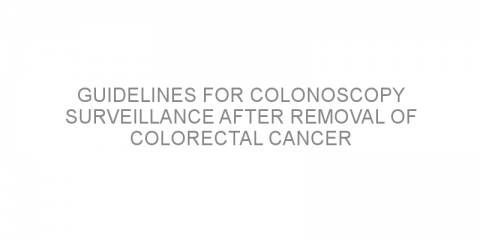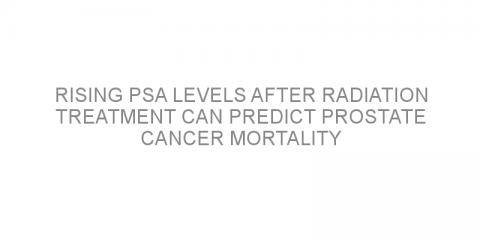‘Chemobrain’ is the colloquial term for changes in cognitive functioning following chemotherapy for cancer treatment. As a result of a growing need, more cancer centers started testing interventions for cancer-related cognitive dysfunction, notably cognitive behavioral therapy (CBT). The paper presents an overview on current studies...
Read MoreCurrent stage?-Stage I Posts on Medivizor
Guidelines for colonoscopy surveillance after removal of colorectal cancer
In a nutshell This review presents the recommendations of The American Cancer Society and the US Multi-Society Task Force on the use of colonoscopy for the follow up of patients with resected colorectal cancer (CRC). Some background Patients who undergo surgery for CRC with curative-intent (complete removal of the cancer) are candidates for...
Read MoreA genetic profile which identifies patients who will respond to preoperative chemoradiation for rectal cancer
In a nutshell This study looks at the treatment of locally advanced rectal cancer with chemoradiation prior to surgery, and if there are variations in the cancer genes which make some more sensitive to this treatment than others. They find that changes in three individual genes made cancers less sensitive to chemoradiation, and may be a useful...
Read MoreTowards guidelines to prevent colorectal cancer recurrence
This article presents results of recent studies concerning the interplay between the body's chemistry and behavioral factors that influence colorectal cancer (CRC) recurrence. Recent advances in CRC treatment have produced new and promising biological treatments. However, tumors sometimes have unique features that render many of these therapies...
Read MoreEvaluating cancer outcomes and safety of laparoscopic prostatectomy in patients with recurrent prostate cancer
In a nutshell The present study evaluated the safety, adverse effects and cancer outcomes of Salvage Robotic Assisted Laparoscopic Radical Prostatectomy (sRALP) in patients with recurrent prostate cancer. The procedure was surgically safe, yet 18% of the patients had another recurrence within 16 months of surgery. Some background...
Read MoreThe impact of radiotherapy protocol on quality of life in patients with operable rectal cancer
In a nutshell This article evaluated the long-term quality of life of patients with rectal cancer, treated with either a short course of radiation before surgery, or postoperative chemo-radiation. Patients treated with pre-operative radiation reported worse sexual- and bowel-related functional outcomes. Some background In patients with...
Read MoreComparison between two techniques of breast surgery: 20-year follow-up
In a nutshell This study compared breast cancer recurrence rates and overall survival between women treated with breast-conserving surgery versus radical mastectomy. Results showed that in the case of small tumors, breast-conserving surgery is the recommended option. Some background Most patients with breast cancer have surgery to remove the...
Read MoreHigh intensity focused ultrasound: a treatment option for men with recurrent, localized prostate cancer previously treated with radiation
In a nutshell This paper evaluated the use of High Intensity Focused Ultrasound (HIFU) to treat recurrent prostate cancers that are confined to the prostate gland (T1 and T2) and that have previously been treated with External Beam Radiation Therapy (EBRT). HIFU treatment has led to minimal PSA levels, and negative biopsies in about 58% of the...
Read MorePersonalizing breast cancer treatment based on the genetic “finger-print” of the tumor
This article discusses how tests such as the Oncotype DX or Mammaprint can be used to design individual treatment plans for patients with breast cancer. Patients with stage I and stage II breast cancer are treated similarly. Following surgical removal of a breast tumor, systemic (body-wide) treatment is often used. This secondary treatment is...
Read MoreComparison between different chemotherapy regimens for early breast cancer
In a nutshell The present study compared the long-term efficacy and safety of different adjuvant chemotherapy regimens for breast cancer. Main results: chemotherapy clearly provides survival benefits; the higher the dosage, the higher the survival rates, despite more toxicity. Some background Many women with early stage breast cancer receive...
Read MoreRising PSA levels after radiation treatment can predict prostate cancer mortality
In a nutshell This article evaluated whether the interval to biochemical failure (IBF) can be used as a prediction factor for prostate cancer mortality. The IBF was found to be the best current predictor of prostate cancer mortality in patients previously treated with radiation therapy. Some background Biochemical failure is defined...
Read MoreComparison between laparoscopic and open surgery for colon cancer
In a nutshell The present study compares two surgical techniques for the treatment of colon cancer: Open Colectomy (OC) and Laparoscopic Assisted Colectomy (LAC). They found that LAC may be preferred to OC for removal of colon cancer. Some background The first treatment of choice for colon cancer which is localized to the colonic...
Read More














